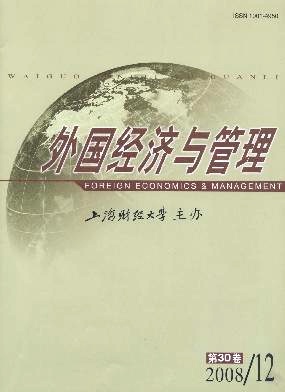基于员工—组织关系视角的人力资源管理实践、组织支持与知识共享问题探讨
外国经济与管理 2008 年 第 30 卷第 12 期, 页码:52 - 58
摘要
参考文献
摘要
知识共享是企业创新的重要驱动因素,人力资源管理实践是促进知识共享的有效策略,只有对知识共享的主体——知识拥有者进行有效的管理,才能真正促进组织的知识共享。本文首先对社会关系视角下人力资源管理实践对知识共享的作用机制进行了分析,指出社会关系只能提高员工知识共享的可能性与便利性,但不能很好地解释员工知识共享意愿的形成机制;然后基于员工—组织关系视角,引入"组织支持感"来揭示人力资源管理实践对知识共享意愿的作用机制,并讨论其在我国转型经济和特定文化背景下的理论意义与现实指导价值。
[1]Hislop,D.Linking human resource management and knowledge management via commit ment:A review and research agenda[J].Employee Relations,2003,25(2):l82-202.
[2]Szulanski,G.Exploringinternal stickiness:I mpedi ments to the transfer of best practice within the firm[J].Strategic Management Journal,1996,17(Special Issue):27-44.
[3]Calantone,R J,and Zhao,Y S.Learning orientation,firminnovation capability,and firm performance[J].Industrial Marketing Management,2002,31:211-223.
[4]Hsiu-Fen Lin.Effects of extrinsic andintrinsic motivations on employee knowledge sharingintentions[J].Journal of Information Sci-ence,2007,33:135-149.
[5]Cabrera,E F,and Cabrera,A.Fostering knowledge sharing through people management practices[J].The International Journal of Human Resource Management,2005,16(5):720-735.
[6]Bartol,K M,and Srivastava,A.Encouraging knowledge sharing:Arole of organizational reward systems[J].Journal of Leadership&Organizational Studies,2002,9(1):54-77.
[7]I-Chieh Hsu.Knowledge sharing practices as a facilitating factor for i mproving organizational performance through human capital:A preli minary test[J].Expert Systems with Applications,2008,35(3):1316-1326.
[8]Mohan Subramaniam,and Mark A Youndt.Theinfluence of intellectual capital onthe types of innovative capabilities[J].Academy of Management Journal,2005,48(3):450-463.
[9]Hsiu-Fen Lin.I mpact of organizational support on organizational intentiontofacilitate knowledge sharing[J].Knowledge Management Research&Practice,2006,(4):26-35.
[10]Hoof,B V,and Weenen,F D.Committedto share:Commit ment and CMCuse as antecedents of knowledge sharing[J].Knowledgeand Process Management,2004,11(11):l3-24.
[11]Robertson,M,and Hammersley,G.Knowledge management practices within a knowledge intensive firm:The significance of the people management di mension[J].Journal of European Industrial Training,2000,24(2-4):241-253.
[12]Bock,G W,Zmud,R W,Ki m,Y G,and Lee,J N.Behavioral intentionformationin knowledge sharing:Examiningthe roles of ex-trinsic motivators,social-psychological factors,and organizational cli mate[J].MIS Quarterly,2005,29(1):87-111.
[13]Collins,C J.Knowledge exchange and combination:The role of human resource practices in the performance of high-technology firms[J].Academy of Management Journal,2006,49:544-560.
[14]Chowdhury,S.The role of affect-and cognition-based trust in complex knowledge sharing[J].Journal of Managerial Issues,2005,17(3):310-326.
[15]M Ann McFadyen,and Albert ACannella.Social capital and knowledge creation:Di minishing returns of the number and strength of exchange relationships[J].Academy of Management Journal,2004,47(5):735-746.
[16]Cropanzano,R,and Mitchell,MS.Social exchange theory:An interdisciplinary review of conceptual and definitional issues[J].Journal of Management,2005,31:874-900.
[17]Rhoades,L,and Eisenberger,R.Perceived organizational support:Areviewof the literature[J].Journal of Applied Psychology,2002,87:698-714.
[18]Allen,D G,Shore,L M,and Griffeth,R W.The role of perceived organizational support and supportive human resource practices in the turnover process[J].Journal of Management,2003,29(1):99-118.
[19]Bonnie S O’Neill,and Monica Adya.Knowledge sharing andthe psychological contract:Managing knowledge workers across differ-ent stages of employment[J].Journal of Managerial Psychology,2007,22(4):411-436.
[20]Chow,C W,Deng,FJ,and Ho,J L.The openness of knowledge sharing within organizations:Acomparative study of the United States and the People’s Republic of China[J].Journal of Management Accounting Research,2000,12:65-95.
[2]Szulanski,G.Exploringinternal stickiness:I mpedi ments to the transfer of best practice within the firm[J].Strategic Management Journal,1996,17(Special Issue):27-44.
[3]Calantone,R J,and Zhao,Y S.Learning orientation,firminnovation capability,and firm performance[J].Industrial Marketing Management,2002,31:211-223.
[4]Hsiu-Fen Lin.Effects of extrinsic andintrinsic motivations on employee knowledge sharingintentions[J].Journal of Information Sci-ence,2007,33:135-149.
[5]Cabrera,E F,and Cabrera,A.Fostering knowledge sharing through people management practices[J].The International Journal of Human Resource Management,2005,16(5):720-735.
[6]Bartol,K M,and Srivastava,A.Encouraging knowledge sharing:Arole of organizational reward systems[J].Journal of Leadership&Organizational Studies,2002,9(1):54-77.
[7]I-Chieh Hsu.Knowledge sharing practices as a facilitating factor for i mproving organizational performance through human capital:A preli minary test[J].Expert Systems with Applications,2008,35(3):1316-1326.
[8]Mohan Subramaniam,and Mark A Youndt.Theinfluence of intellectual capital onthe types of innovative capabilities[J].Academy of Management Journal,2005,48(3):450-463.
[9]Hsiu-Fen Lin.I mpact of organizational support on organizational intentiontofacilitate knowledge sharing[J].Knowledge Management Research&Practice,2006,(4):26-35.
[10]Hoof,B V,and Weenen,F D.Committedto share:Commit ment and CMCuse as antecedents of knowledge sharing[J].Knowledgeand Process Management,2004,11(11):l3-24.
[11]Robertson,M,and Hammersley,G.Knowledge management practices within a knowledge intensive firm:The significance of the people management di mension[J].Journal of European Industrial Training,2000,24(2-4):241-253.
[12]Bock,G W,Zmud,R W,Ki m,Y G,and Lee,J N.Behavioral intentionformationin knowledge sharing:Examiningthe roles of ex-trinsic motivators,social-psychological factors,and organizational cli mate[J].MIS Quarterly,2005,29(1):87-111.
[13]Collins,C J.Knowledge exchange and combination:The role of human resource practices in the performance of high-technology firms[J].Academy of Management Journal,2006,49:544-560.
[14]Chowdhury,S.The role of affect-and cognition-based trust in complex knowledge sharing[J].Journal of Managerial Issues,2005,17(3):310-326.
[15]M Ann McFadyen,and Albert ACannella.Social capital and knowledge creation:Di minishing returns of the number and strength of exchange relationships[J].Academy of Management Journal,2004,47(5):735-746.
[16]Cropanzano,R,and Mitchell,MS.Social exchange theory:An interdisciplinary review of conceptual and definitional issues[J].Journal of Management,2005,31:874-900.
[17]Rhoades,L,and Eisenberger,R.Perceived organizational support:Areviewof the literature[J].Journal of Applied Psychology,2002,87:698-714.
[18]Allen,D G,Shore,L M,and Griffeth,R W.The role of perceived organizational support and supportive human resource practices in the turnover process[J].Journal of Management,2003,29(1):99-118.
[19]Bonnie S O’Neill,and Monica Adya.Knowledge sharing andthe psychological contract:Managing knowledge workers across differ-ent stages of employment[J].Journal of Managerial Psychology,2007,22(4):411-436.
[20]Chow,C W,Deng,FJ,and Ho,J L.The openness of knowledge sharing within organizations:Acomparative study of the United States and the People’s Republic of China[J].Journal of Management Accounting Research,2000,12:65-95.
引用本文
何会涛, 彭纪生. 基于员工—组织关系视角的人力资源管理实践、组织支持与知识共享问题探讨[J]. 外国经济与管理, 2008, 30(12): 52–58.
导出参考文献,格式为:
下一篇:创业自我效能研究述评





 7215
7215  428
428

